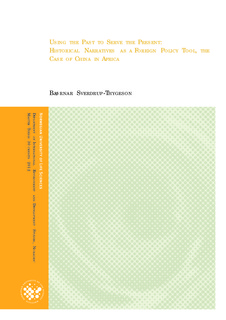| dc.description.abstract | This thesis takes as its objective to explore the use of historical narratives as a tool of foreign policy. In order to undertake research on how such narratives may be utilised by foreign policy actors, and how they may convey an impact on foreign countries’ discourses, I develop a theoretical framework based on a post-structuralist theoretical approach. This model features a three-pronged analysis of what I define as the mnemonic means through which historical narratives may convey an impact on present discursive structures, namely those of identity, analogy and historical legitimacy.
Through my thesis I apply this theoretical framework to a single-case study, intended as a plausibility probe to determine the potential salience and scientific validity of this approach, by means of a discourse analysis applied to the case of China’s propagation of historical narratives in support of the country’s policies in Africa. Through this case, I also intend to throw further light on China’s far-ranging engagement on the African continent. Through its application to the case of China’s public relations-offensive towards Africa, the analysis ascertained how historical narratives have proven to be a major feature of Chinese rhetoric. Being in widespread and consistent use, politicians, diplomats and media would draw upon three particular historical narratives in addressing the African public. Through propagating the narratives centred on Zheng He, on the colonial experience, and on the TAZARA railroad project, using a varied set of mnemonic techniques, the past was framed in terms that serve to influence African China-discourses in directions legitimising and promoting policies beneficial to China, supporting China’s present engagement in Africa by invoking the past.
This impact of the past upon the present is thus, I conclude, a tool that indeed would seem to be utilised by powerful actors on the international arena, seeking to establish a positive discursive environment among politically important actors abroad. Furthermore, as this tool could be saliently analysed through the proposed post-structuralist theoretical framework in the case of China’s Africa policy, I propose that this theoretical approach might also prove fruitful as a framework applied to other cases. In this I find my study to contribute to an area currently lacking in academic coverage, an area that might add valuable insights into the discursive processes co-constituting states’ foreign policies. | no_NO |
